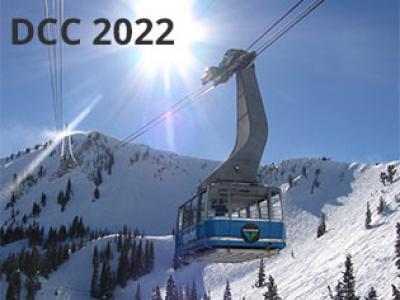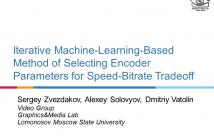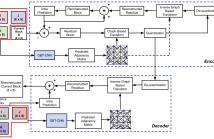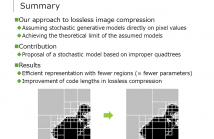

- Read more about JMPNET: JOINT MOTION PREDICTION FOR LEARNING-BASED VIDEO COMPRESSION
- 1 comment
- Log in to post comments
- Categories:
 16 Views
16 Views
- Categories:
 88 Views
88 Views- Read more about An Edge Aware Motion Modeling Technique Leveraging on the Discrete Cosine Basis Oriented Motion Model and Frame Super Resolution
- Log in to post comments
To capture motion homogeneity between successive frames, the edge position difference (EPD) measure based motion modeling (EPD-MM) has shown good motion compensation capabilities. The EPD-MM technique is underpinned by the fact that from one frame to next, edges map to edges and such mapping can be captured by an appropriate motion model. An example of such a motion model is the discrete cosine basis oriented (DCO) motion model, which can capture complex motion and has a smooth and sparse representation.
- Categories:
 53 Views
53 Views
- Read more about Iterative Machine-Learning-Based Method of Selecting Encoder Parameters for Speed-Bitrate Tradeoff
- Log in to post comments
Modern codecs offer numerous settings that can nonuniformly alter the encoding process. Some researchers have proposed video encoding multiobjective optimization, but none of these proposals addresses optimization of the entire encoder's option space when it is large. In this paper, we present a method for multiobjective encoding optimization of a given encoder in terms of relative video bitrate and encoding speed. The process takes place over one or more videos against a set of reference presets. It actively exploits similarities in the encoding process for similar videos.
DCC2022-v2.pdf
- Categories:
 228 Views
228 Views
- Read more about Adaptive bilateral matching for decoder side motion vector refinement in video coding
- Log in to post comments
This paper presents an adaptive bilateral matching technique for decoder-side motion vector refinement in video coding. It allows encoder to choose not only the conventional bilateral matching mode with symmetric motion vector difference but also the asymmetric alternatives. To study the efficiency of the proposed technique, the proposed method is integrated in the Versatile Video Coding Test Model 11.0. The experimental result reports an overall of -2.78% luma Bjøntegaard Delta rate for the random-access configurations.
- Categories:
 77 Views
77 Views
- Read more about Graph-based Transform based on 3D Convolutional Neural Network for Intra-Prediction of Imaging Data
- Log in to post comments
This paper presents a novel class of Graph-based Transform based on 3D convolutional neural networks (GBT-CNN) within the context of block-based predictive transform coding of imaging data. The proposed GBT-CNN uses a 3D convolutional neural network (3D-CNN) to predict the graph information needed to compute the transform and its inverse, thus reducing the signalling cost to reconstruct the data after transformation.
- Categories:
 46 Views
46 Views
- Read more about Joint Rate Distortion Optimization with CNN-based In-Loop Filter For Hybrid Video Coding
- Log in to post comments
- Categories:
 84 Views
84 Views
- Read more about Stochastic Model of Block Segmentation Based on Improper Quadtree and Optimal Code under the Bayes Criterion
- Log in to post comments
Most previous studies on lossless image compression have focused on improving preprocessing functions to reduce the redundancy of pixel values in real images. However, we assumed stochastic generative models directly on pixel values and focused on achieving the theoretical limit of the assumed models. In this study, we proposed a stochastic model based on improper quadtrees. We theoretically derive the optimal code for the proposed model under the Bayes criterion. In general, Bayes-optimal codes require an exponential order of calculation with respect to the data lengths.
- Categories:
 77 Views
77 Views
- Read more about Deep Correlated Image Set Compression Based on Distributed Source Coding and Multi-Scale Fusion
- Log in to post comments
In this paper, we present a deep correlated image set compression scheme based on Distributed Source Coding(DSC) and multi-scale image fusion. As there exists strong correlation among images in a similar image set, we propose to utilize such correlation to generate side information at decoder side for each image in the set. Specifically, a reference structure of the image set is generated by building a minimum spanning tree according to the similarity between two images at encoder.
- Categories:
 53 Views
53 Views